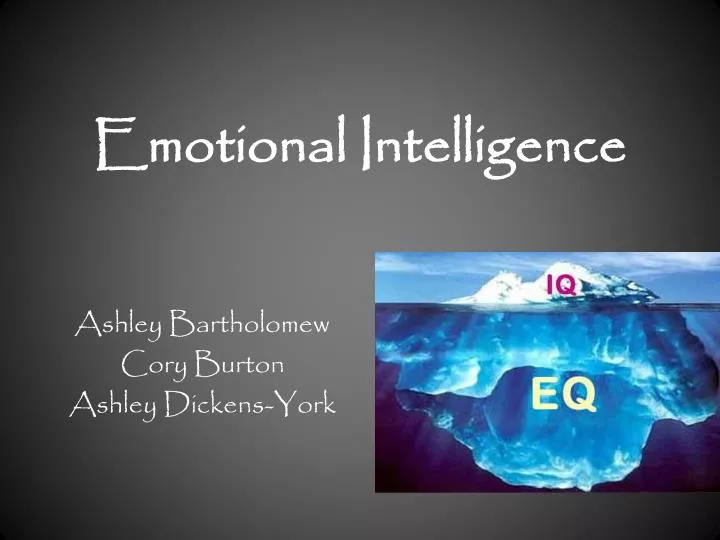

Emotional Intelligence
Mar 13, 2019
780 likes | 1.58k Views
Emotional Intelligence. Ashley Bartholomew Cory Burton Ashley Dickens-York. Overview of Emotional Intelligence. Brief History EI Models/Measurement Ability Based Model Trait EI Model Mixed Models Problems/Criticisms of EI EI in the Workplace. Origins of the Concept.
Share Presentation
- intelligence
- emotional intelligence
- emotions ability
- model measurement
- emotional intelligence ei
- term emotional intelligence finally

Presentation Transcript
Emotional Intelligence Ashley Bartholomew Cory Burton Ashley Dickens-York
Overview of Emotional Intelligence • Brief History • EI Models/Measurement • Ability Based Model • Trait EI Model • Mixed Models • Problems/Criticisms of EI • EI in the Workplace
Origins of the Concept • Darwin’s early work on the importance of emotional expression for survival (1870s) • E.L. Thorndike (1920) used the term social intelligence to describe the skill of understanding and managing other people **
Origins of the Concept • David Wechsler (1940) described the influence of non-intellectual factors on intelligent behavior • Argued that models of intelligence won’t be complete until they adequately describe these factors **
Origins of the Concept • Howard Gardner (1983) introduced the ideal of multiple intelligences • Interpersonal intelligence: the capacity to understand the intentions, motivations, and desires of other people • Intrapersonal intelligence: the capacity to understand oneself, to appreciate one’s feelings, fears, and motivations **
Origins of the Concept • The term “Emotional Intelligence” finally became widely popular upon the publication of Daniel Goleman’s best seller • Emotional Intelligence: Why It Can Matter More Than IQ **
Emotional Intelligence Models • Much confusion regarding exact meaning of this construct • Defined slightly differently by each model • 3 main models of EI: • Ability EI Models • Trait EI Model • Mixed Models of EI
Ability Based EI • Developed by Peter Salovey and John D. Mayer • Define EI: “the ability to perceive emotion, integrate emotion to facilitate thought, understand emotions, and to regulate emotions to promote personal growth” **
Ability Based EI: Assumptions • Emotional intelligence defined within the confines of the standard criteria for a new intelligence • Emotions are useful sources of info that help one to make sense of/navigate their social environments **
Ability Based EI: Assumptions • Individuals vary: • In their ability to process information of an emotional nature • In their ability to relate emotional processing to a wider cognition • These abilities manifest in certain adaptive behaviors **
Ability Based EI: Assumptions • Emotional Intelligence Abilities: • Perceiving Emotions - ability to decipher emotions in faces, pictures, voices, and cultural artifacts • Understanding Emotions - ability to comprehend emotion language and to appreciate complicated relationships among emotions **
Ability Based EI: Assumptions • Emotional Intelligence Abilities: • Using Emotions - ability to harness emotions to facilitate various cognitive activities, such as thinking and problem solving • Managing Emotions - ability to regulate emotions in both ourselves and in others **
Ability Based EI: Measurement • MSCEIT: Mayer-Salovey-Caruso Emotional Intelligence Test • Based on a series of emotion-based problem-solving items • Tests individual’s abilities on each of the four branches of emotional intelligence • Scores generated for each of the four branches as well as a total score **
Ability Based EI: Measurement • MSCEIT: Scoring • Individual’s responses compared to those provided by worldwide sample of respondents • With higher scores indicating higher overlap between individual and comparison group • Expert-scored • Where individual’s score is compared to a group of 21 emotion researchers • Unlike IQ test, items on MSCEIT do not have objectively correct responses • Difficult to regard as a genuine intelligence
Ability Based EI: Measurement Issues • MSCEIT may only measure knowledge, not ability: That is, even though someone may know how to behave in an emotional situation, he/she may not be able to carry out behavior (Brody, 2004) • MSCEIT may only measure conformity • (Roberts et al., 2001) • Self-report measures are susceptible to social desirability bias
Trait EI Model • Proposed by Petrides et. al. (2000) • Major critics of ability based model and MSCEIT • Defined Trait EI: “a constellation of emotion-related self-perceptions located at the lower levels of personality” • Based on individual’s self-perceptions of their emotional abilities **
Trait EI: Measurement • TEIQue: Trait Emotional Intelligence Questionnaire • Self-report inventory • 15 subscales organized under 4 factors: • Well-being • Self-control • Emotionality • Sociability • Along with scores for the subscales and main factors, a global trait EI score is also given **
Trait EI: TEIQue Measurement
Trait EI: Findings • TEIQue: • Scores have been found to be globally normally distributed and reliable • Scores were not related to nonverbal reasoning • Possible support for the personality trait view • Related to Big 5: • Positively related – Extraversion, Agreeableness, Openness, Conscientiousness • Inversely related – Neuroticism **
Mixed Models of EI:Emotional Competencies • Developed by Daniel Goleman • Define EI: “a wide array of competencies and skills that drive leadership performance” • People are born with general emotional intelligence that determines their potential for learning emotional competencies • These competencies are learned capabilities that must be worked on to achieve outstanding performance **
Mixed Models of EI:Emotional Competencies • Personal Competence
Mixed Models of EI:Emotional Competencies • Social Competence
Emotional Competencies:Measurement • Two measurement tools for Goleman’s model • ECI: Emotional Competency Inventory, 1999 • Revised; ESCI: Emotional and Social Competency Inventory, 2007 • Emotional Intelligence Appraisal, 2001 • Can be self-report • Or 360-degree assessment **
Emotional Competencies:Measurement • ECI – Emotional Competence Inventory • Approximately 40% of items came from an older instrument, the Self-Assessment Questionnaire • Developed by Boyatzis, 1994 • These earlier items have been validated against performance in hundreds of competency studies of managers, executives, and leaders in North America, Italy, and Brazil • There is no research that supports the validity of ECI
Mixed Models of EI: Bar-On Model of Emotional-Social Intelligence • Developed by Reuven Bar-On • 1st to use the term: Emotion Quotient • Define EI: “being concerned with effectively understanding oneself and others, relating well to people, and adapting to and coping with the immediate surroundings to be more successful in dealing with environmental demands” **
Bar-On EI Model: Assumptions • Emotional intelligence develops over time • Can be improved through training or therapy • Emotional intelligence and cognitive intelligence contribute equally to a person’s general intelligence, which then indicates one’s potential to succeed in life • Individuals with higher than average EQ’s are in general more successful in meeting environmental demands and pressures • Deficiency in EQ can mean a lack of success and emotional problems **
Bar-On EI Model: Factors
Bar-On Model: Factors
Bar-On Model: Measurement • EQ-I: Bar-On Emotion Quotient Inventory • 133 questions used to obtain a Total EQ • Also gives 5 composite scale scores corresponding to the 5 main components of the model • Not meant to measure personality traits or cognitive capacity; rather the mental ability to be successful in dealing with environmental demands and pressures
Bar-On Model:Measurement Issues • EQ-I • Self-report, highly susceptible to faking • Originally developed in a clinical setting, not the work environment • Much is known about its reliability and convergent and discriminate validity • Little is known about its predictive ability in the work environment • However, EQ-I was predictive of success for U.S. Air Force recruiters; by using the test, the Air Force saved 3 million dollars annually
Is EI a Form of Intelligence? • “Goleman exemplifies more clearly than most the fundamental absurdity of the tendency to class almost any type of behavior as an ‘intelligence’…If these five ‘abilities’ define ‘emotional intelligence’, we would expect some evidence that they are highly correlated; Goleman admits that they might be quite uncorrelated, and in any case if we cannot measure them, how do we know they are related? So the whole theory is built on quicksand: there is no sound scientific basis.” • Eysenck, 2000
Is EI a Form of Intelligence? • Locke (2005) suggested that emotional intelligence is not a new or distinct form of intelligence; rather, it is simply the intelligence construct applied to the domain of emotions. Hence, it is more like a skill.
Does EI Have Predictive Value? • Davies, Stankov, & Roberts (1998) concluded that there was nothing empirically new in the idea of emotional intelligence • Measures utilized at that time were new, and little was known about their psychometric properties (Cherniss, 2000) • Landy (2005) stated that the few incremental validity studies conducted on EI have shown that it adds nothing of real value to prediction of academic and work success
EI Measurement Issues • Business vs. Academics – the former often make grandiose predictions predicated upon emotional intelligence while the latter warns against unscientific abuses
EI Measurement Issues • For example: Goleman has asserted “the most effective leaders are alike in one crucial way: they all have a high degree of what has come to be known as emotional intelligence…EI is the sine qua non of leadership” • Mayer rebuts, “the popular literature’s implication-that highly emotionally intelligent people possess an unqualified advantage in life-appears overly enthusiastic at present and unsubstantiated by reasonable scientific standards”
EI and Gender Differences • Women are higher than men: • Empathy • Social Responsibility • Men are higher than women: • Stress Tolerance • Self Confidence
EI in the Workplace • Critics believe that improving literacy and analytical skills is the best way to improve job performance • Cognitive skills will only get you in the door • Steve Stein
EI in the Workplace • Highly Emotional Intelligent Employees: • Lower absenteeism • Better psychological health • Higher commitment • Clearer role boundaries • Higher job satisfaction • Better coping skills • Higher levels of responsibility and performance
EI in the Workplace • Importance of EI in bosses and leaders • CEO Information Vacuum • Tasler & Su • Measured EI of employees from janitors to CEOs
EI in the Workplace • Different jobs call for different EIQ • Sales associate • Tennis pro
Improving Company EI • Incorporate EI into hiring process • Develop interview questions to assess: • Self- awareness • Interpersonal skills • Stress management • Adaptability • Optimism • Level of happiness
Improving Company EI • Assess EI of current and possible future leaders • EQ-I • MSCEIT • ECI • Amend performance appraisals to include how the job gets done
Improving Company EI • Teaching EI • Work with psychologists and executive coaches • Stress management • Learn importance of listening, reading moods, and gaining trust
References • Bielaszka-DuVernay, C. (2008). Hiring for Emotional Intelligence. Harvard Management Update. p. 3-5. • Cherniss, C. (2000). Emotional Intelligence: What it is and why it matters. Paper presented at the annual meeting of the Society for Industrial and Organizational Psychology. • Conrad, J. (2008). What’s Your Company’s EQ? Business West. p. 61. • Kimberly, J. (2008). How to fill the CEO information vaccum. New Hampshire Business Review. p. 27. • Mayer, J.D., Caruso, D.R., & Salovey, P. (2000). Emotional intelligence meets traditional standards for an intelligence. Intelligence 27(4), 267-298.
References • Murray, B. (1998). Does emotional intelligence matter in the workplace? APA Online. (29)7 p. 1-3. • http://www.eiconsortium.org/measures/teique.html • http://webhome.idirect.com/~kehamilt/ipsyeq.html • http://www.eiconsortium.org/measures/eqi.html • http://en.wikipedia.orgwikiEmotional_intelligence • http://www.indiana.edu/~intell/ethorndike.shtml
- More by User
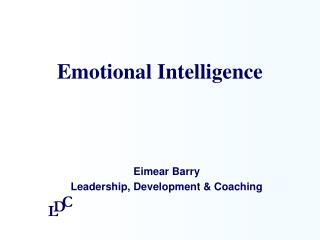
C. D. L. Emotional Intelligence. Eimear Barry Leadership, Development & Coaching. Emotional Intelligence. An array of non cognitive, capabilities, competencies and skills that influence one’s ability to succeed in life and directly influence ones general psychological well being.
1.02k views • 11 slides

Emotional Intelligence. Emotional Intelligence Is The Key To Success. “’Emotional Intelligence’ refers to the capacity for recognizing our own feelings and those of others, for motivating ourselves, and for managing emotions well in ourselves and in our relationships.” * Self-awareness
522 views • 8 slides

Emotional Intelligence. Quick Facts. Your Emotional I.Q. is completely separate from your regular I.Q. Your Emotional I.Q. is related to how happy you are . Developing Your E.Q. Develop the courage to follow your own feelings
1.46k views • 8 slides

EMOTIONAL INTELLIGENCE
EMOTIONAL INTELLIGENCE. WHY IT MATTERS. HISTORICAL OVERVIEW. 1990 – Salovey & Mayer coin term “emotional intelligence
859 views • 17 slides

Emotional intelligence
Emotional intelligence. BOH4M: Leadership. Key Theorists. Peter Salovey and John D. Mayer defined the concept Daniel Goleman applied it to leadership performance, and outlined it in more detail
488 views • 28 slides

Emotional Intelligence. What is Intelligence?. Typically focused on analytic reasoning verbal skills attention memory judgement. IQ. A weak predictor for achievement job performance success overall success, wealth, & happiness
676 views • 20 slides

Emotional intelligence. Old yard stick of judgement. Old yard stick of judgement. Training . Old yard stick of judgement. Training expertise. New yard stick of judgement. New yard stick of judgement. How we manage ourselves. New yard stick of judgement. How we manage ourselves
3.1k views • 261 slides

458 views • 4 slides

Emotional Intelligence. What is it and how do I use it?. What is Emotional Intelligence?. Pre-Test. Pre-Test. True or False?. Emotion is any feeling creating an excited mental state. True. Pre-Test. True or False?.
2.23k views • 81 slides

EMOTIONAL INTELLIGENCE. EMOTIONAL INTELLIGENCE. Understand Your Brain . REACTION. REACTION. Twmedia / Dreamstime stock photos. Self Awareness. People are not creatures of logic, but of emotions. Dale Carnegie. Amaygdala. Manage Your Emotions. s o s S Stop O Oxygenate
561 views • 20 slides

Emotional Intelligence. Katie Brown. OVERVIEW. Definition of Emotional Intelligence (EI) Brief History EI Models and Measurement Ability Based Model Mixed Models Trait EI Model Criticisms of EI EI in the Workplace. Emotional Intelligence.
2.88k views • 22 slides

EMOTIONAL INTELLIGENCE . Leading and Serving with Emotion Intelligence. During this session, you will…. …learn about the elements of emotional intelligence. …learn how they are directly related to skills educators use daily in their jobs, and
600 views • 18 slides

Emotional Intelligence. Zafar A Reshi Department of Botany University of Kashmir Srinagar. Structure of the lecture is as follows:. a. Define Emotional Intelligence b. Discuss the origin of the concept of Emotional Intelligence b. Models of Emotional Intelligence
1.96k views • 51 slides

Emotional Intelligence. Presented by the Lawyers assistance Program Facilitated by Robert Bircher. The Concept of “Intelligence”. Most people take this to mean I.Q. which is an attempt to measure cognitive capacity and functioning
428 views • 11 slides

Emotional Intelligence. They have grown up with. The Internet and the World Wide Web for the general user PCs requiring few keyboard skills Sophisticated computer graphics Cellular phones Instant messaging. DVD Digital Audio - Mp3, iPod TiVo DVR devices HDTV
619 views • 19 slides

Emotional Intelligence. What is Below the Surface…. Joshua Willard UMUC Europe HRMN 302. Main Points. What is Emotional Intelligence? How can it be used in the workplace? How to improve Emotional Intelligence? How does it compare with IQ?. Emotional Intelligence.
2.4k views • 13 slides

Emotional Intelligence. A Leader’s Primer. What is emotional Intelligence?
1.15k views • 24 slides

Emotional Intelligence:
Emotional Intelligence:. Master Your Emotions – To Master Your Life EUMA Training Day Programme Helsinki, Finland 17 April 2010. Angie Katselianos – President & CEO. EUMA Training Day 2010 Emotional Intelligence.
421 views • 6 slides

Emotional Intelligence. What is Emotional Intelligence?. Capacity to recognize your feelings and the feelings of others. Emotional Intelligence Quotient – similar to measuring your IQ, your EIQ can directly correlate to how successful you are.
992 views • 22 slides

Emotional Intelligence. Carrie Hefner ~ Bonnie Knight ~ Risa Jones ~ Karen McCullough. Anticipatory Survey. To gauge our students’ present level of emotional intelligence for class, we propose immersing our students in an anticipatory warm-up exercise called, “ Text a Keyword. ”
394 views • 17 slides

Emotional Intelligence. The ability to perceive, control, and evaluate emotions. Some researchers suggest that emotional intelligence can be learned and strengthened, while other claim it is an inborn characteristic.
3.3k views • 11 slides
Emotional Intelligence

Emotional intelligence is the single biggest predictor of performance in the workplace and the strongest driver of leadership & personal excellence. So what is emotional intelligence? Read less
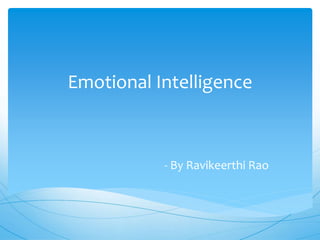
More Related Content
- 1. Emotional Intelligence - By Ravikeerthi Rao
- 2. We all have different personalities, different wants & needs, and different ways of showing our emotions. If we hope to succeed in life we need to navigate through this and all it takes tact and cleverness. This is where EI becomes important. Emotional Intelligence (EI)
- 3. Emotional Intelligence, or EI, is the ability to identify, assess, and manage the emotions of one's self, and of others. In other words, it is a distinct combination of emotional and social skills and competencies that influence our overall capability to cope effectively with demands and pressures of work and life. EQ, or Emotional Quotient, is how one measures Emotional Intelligence Emotional Intelligence (EI)
- 4. Emotional Intelligence, or EI, is the ability to identify, assess, and manage the emotions of one's self, and of others. EQ, or Emotional Quotient, is how one measures Emotional Intelligence Emotional Intelligence (EI)
- 5. You need to understand the emotions to : relate better to other people, form healthier relationships, achieve greater success at work, and lead a more fulfilling life. Emotional Intelligence (EI)
- 6. The ability to express and control our own emotions is important. At the same time our ability to understand, interpret, and respond to the emotions of others, is equally important. You can identify /realise when your friend is feeling sad or when a co-worker is angry , right? Psychologists refer to this ability as Emotional Intelligence. Emotional Intelligence (EI)
- 7. Some researchers suggest that emotional intelligence can be learned and strengthened, while other claim it is an inborn characteristic. Emotional Intelligence (EI)
- 8. Emotional intelligence (EI) is important to communicate effectively, empathize with others, overcome challenges, and defuse conflict. Emotional intelligence impacts many different aspects of your daily life, such as the way you behave and the way you interact with others. Emotional Intelligence (EI)
- 9. Emotional intelligence has four components. Self awareness Self-management Social awareness Relationship management Emotional Intelligence (EI)
- 10. Self awareness: Your understanding of your strengths and weaknesses, your motivation factors, and how & why you respond to situations in a particular way. Self-awareness lies at the heart of the EI model and, to a great extent, influences our ability to develop the other competencies. It enables us to sustain our behaviour over time, despite setbacks. In short – Self awareness is understanding own moods & emotions Emotional Intelligence (EI)
- 11. Social awareness: Under this context, EI is the ability to hear and understand others' thoughts, feelings and concerns, even when partly expressed or unspoken. It's being aware of others needs. It covers how we manage the emotions of others. Emotional Intelligence (EI)
- 12. Self-management: It is how effectively we manage our own emotions, and how well we control our responses to new or challenging situations. Emotional self-control is the ability to keep impulsive feelings and emotions under control. i.e. Think before act! Emotional Intelligence (EI)
- 13. Relationship management: (social skill) is our ability to apply emotional understanding in our dealings with others. This is where emotional intelligence becomes most visible to the people we deal with (putting EI to work). It includes the ability to develop relationships, build rapport (trust). It’s the culmination of the other 3 dimensions of EI. Emotional Intelligence (EI)
- 14. Why is emotional intelligence (EI) so important? Emotional Intelligence (EI)
- 15. Your performance at work. Emotional intelligence can help you navigate the social complexities of the workplace, lead and motivate others, and excel in your career. In fact, many companies now view emotional intelligence as being as important as technical ability and require EQ testing before hiring. Why is emotional intelligence so important?
- 16. Your physical health. If you’re unable to manage your stress levels, it can lead to serious health problems. Uncontrolled stress can raise blood pressure, suppress the immune system, increase the risk of heart attack and stroke, contribute to infertility, and speed up the aging process. The first step to improving emotional intelligence is to learn how to relieve stress. Why is emotional intelligence so important?
- 17. Your mental health. Uncontrolled stress can also impact your mental health, making you vulnerable to anxiety and depression. If you are unable to understand and manage your emotions, you’ll also be open to mood swings, An inability to form strong relationships can leave you feeling lonely and isolated. Why is emotional intelligence so important?
- 18. Your relationships. By understanding your emotions and how to control them, you’re better able to express how you feel and understand how others are feeling. This allows you to communicate more effectively and forge stronger relationships, both at work and in your personal life. Why is emotional intelligence so important?
- 19. All information to the brain comes through our senses, and when this information is overwhelmingly stressful or emotional, instinct will take over and our ability to act will be limited to the flight, fight, or freeze response. Therefore, to have access to the wide range of choices and the ability to make good decisions, we need to be able to bring our emotions into balance at will. How to raise your emotional intelligence?
- 20. To improve your emotional intelligence—and your decision-making abilities—you need to understand and manage your emotions. This is accomplished by developing key skills for controlling and managing overwhelming stress. How to raise your emotional intelligence?
- 21. Developing emotional intelligence through a few key skills: Emotional Intelligence is built by reducing stress, remaining focused, and staying connected to yourself and others. You can do this by learning 5 key skills. The first two skills are essential for controlling and managing overwhelming stress and the last three skills greatly improve communication. How to raise your emotional intelligence?
- 22. Each skill builds on the lessons learned in practicing the earlier skills and include: 1. The ability to quickly reduce stress in the moment in a variety of settings 2. The ability to recognize your emotions and keep them from overwhelming you 3. The ability to connect emotionally with others by using nonverbal communication 4. The ability to use humour and play to stay connected in challenging situations 5. The ability to resolve conflicts positively and with confidence How to raise your emotional intelligence?
- 23. In order to permanently change behaviour in ways that stand up under pressure, you need to learn how to overcome stress in the moment and stress in your relationships by remaining emotionally aware. This means that you can’t simply read about emotional intelligence in order to master it. You have to experience and practice the skills in your everyday life. How to raise your emotional intelligence?
- 24. Humor, laughter, and play are natural antidotes to life’s difficulties; they lighten your burdens and help you keep things in perspective. A good hearty laugh reduces stress, elevates mood, and brings your nervous system back into balance. How to raise your emotional intelligence?
- 25. IQ, or intelligence quotient EQ or emotional intelligence quotient Traditional Intelligence versus Emotional Intelligence
- 26. IQ It is the standard measures of intelligence (i.e. IQ scores) Some argument is that it is too narrow and do not encompass the full range of human intelligence, human abilities and knowledge. Some critics began to realize that high intelligence no guarantee for success in life. IQ & EQ
- 27. IQ is still recognized as an important element of success, particularly when it comes to academic achievement. People with high IQs typically to do well in school, often earn more money, and tend to be healthier in general. IQ & EQ
- 28. IQ, or intelligence quotient, is a number derived from a standardized intelligence test. Today, scores on most IQ tests are calculated by comparing the test taker's score to the scores of other people in the same age group. IQ & EQ
- 29. IQ & EQ
- 30. EQ, or Emotional Quotient, on the other hand, is a measure of a person's level of Emotional Intelligence (EI). IQ & EQ
- 31. Differences between EQ and IQ
- 32. The concept of emotional intelligence (EI) has had a strong impact in a number of areas, including the business world. It is important to monitor one's own and others' feelings and emotions, to discriminate among them and to use this information to guide one's thinking and actions. Emotional Intelligence
- 33. A high EQ is an important quality for business leaders and managers to have. The Harvard Business Review has hailed emotional intelligence as “a ground-breaking, paradigm- shattering idea,” one of the most influential business ideas of the decade. Emotional Intelligence
- 34. "Research carried out by the Carnegie Institute of Technology shows that 85 percent of your financial success is due to skills in “human engineering,” your personality and ability to communicate, negotiate, and lead. Shockingly, only 15 percent is due to technical knowledge. Emotional Intelligence (EI)
- 35. That means : "IQ alone is not enough; EQ also matters. In fact, psychologists generally agree that among the ingredients for success, IQ counts for roughly 10% (at best 25%); the rest depends on everything else— including EQ.“ i.e. people with average IQs outperform others with considerably high IQs, almost 75 per cent of the time. Emotional Intelligence (EI)
- 36. Additionally, Nobel Prize winning Israeli-American psychologist, Daniel Kahneman, found that : people would rather do business with a person they like and trust rather than someone they don’t, even if the likeable person is offering a lower quality product or service at a higher price.“ Emotional Intelligence (EI)
- 37. Impact : Because of low EI people may suffer alienation or Sense of estrangement , especially at work place, as they could not relate to their fellow colleagues and co-workers. This alienation will be reflected in their lack of warmth towards the organization leading to lower productivity, directly affecting the performance of the organisation. Emotional Intelligence (EI)
- 38. Emotional intelligence helps you build stronger relationships, succeed at work, and achieve your career and personal goals, communicate clearly, inspire and influence others, work well in a team, and manage conflict. So, you know now what to do……right? OK, That’s fine, Good Luck. Emotional Intelligence (EI)
JavaScript seems to be disabled in your browser. For the best experience on our site, be sure to turn on Javascript in your browser.
Newly Launched - AI Presentation Maker

AI PPT Maker
Powerpoint Templates
PPT Bundles
Kpi Dashboard
Professional
Business Plans
Swot Analysis
Gantt Chart
Business Proposal
Marketing Plan
Project Management
Business Case
Business Model
Cyber Security
Business PPT
Digital Marketing
Digital Transformation
Human Resources
Product Management
Artificial Intelligence
Company Profile
Acknowledgement PPT
PPT Presentation
Reports Brochures
One Page Pitch
Interview PPT
All Categories
Top 10 Emotional Intellegence PowerPoint Presentation Templates in 2024
Emotional intelligence (EI) is a critical skill that enhances personal and professional relationships by enabling individuals to understand, manage, and effectively express their emotions. In the context of presentations, utilizing a PowerPoint (PPT) template focused on emotional intelligence can significantly impact how messages are conveyed and received. These PPTs can be customized to include key concepts such as self-awareness, self-regulation, empathy, and social skills, allowing presenters to tailor their content to resonate with their audience.For instance, a PPT on emotional intelligence can be used in corporate training sessions to help employees develop better interpersonal skills, leading to improved teamwork and collaboration. It can also serve as a valuable resource in educational settings, where teachers can guide students in recognizing their emotions and those of others, fostering a supportive learning environment. Additionally, leaders can use these presentations to promote a culture of emotional awareness within their organizations, enhancing employee engagement and productivity. By incorporating interactive elements, such as discussions or role-playing scenarios, a PPT on emotional intelligence can facilitate deeper understanding and practical application, making it an essential tool for anyone looking to enhance their emotional intelligence in various settings.


Artificial Intellegence Zeitgeist In Ppt Powerpoint Presentation Slide Templates Cpp
Presenting our Artificial Intellegence Zeitgeist In Ppt Powerpoint Presentation Slide Templates Cpp PowerPoint template design. This PowerPoint slide showcases three stages. It is useful to share insightful information on Artificial Intellegence Zeitgeist This PPT slide can be easily accessed in standard screen and widescreen aspect ratios. It is also available in various formats like PDF, PNG, and JPG. Not only this, the PowerPoint slideshow is completely editable and you can effortlessly modify the font size, font type, and shapes according to your wish. Our PPT layout is compatible with Google Slides as well, so download and edit it as per your knowledge.
Our Artificial Intellegence Zeitgeist In Ppt Powerpoint Presentation Slide Templates Cpp are topically designed to provide an attractive backdrop to any subject. Use them to look like a presentation pro.
- Artificial Intellegence Zeitgeist
Related Products

Apple Emotional Branding Role Of Neuromarketing In Emotional Branding
This slide showcases role of neuromarketing concept in preparing emotional branding strategies. It provides details about statistics, brand experiences, subconscious purchase, individual responses, scientific technologies, cognitive, eye tracking, facial coding, etc. Present the topic in a bit more detail with this Apple Emotional Branding Role Of Neuromarketing In Emotional Branding. Use it as a tool for discussion and navigation on Individual Responses, Scientific Technologies, Neuromarketing Utilization. This template is free to edit as deemed fit for your organization. Therefore download it now.
This slide showcases role of neuromarketing concept in preparing emotional branding strategies. It provides details about statistics, brand experiences, subconscious purchase, individual responses, scientific technologies, cognitive, eye tracking, facial coding, etc.
- Individual Responses
- Scientific Technologies
- Neuromarketing Utilization
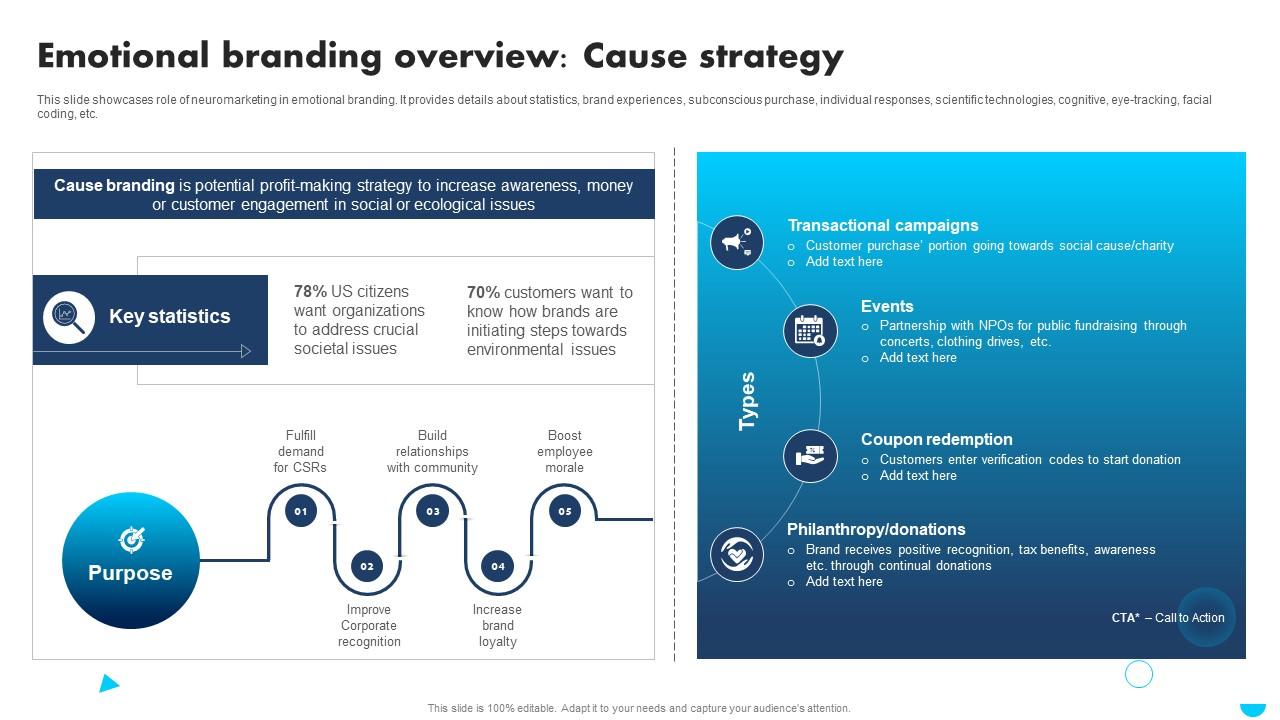
Apple Emotional Branding Emotional Branding Overview Cause Strategy
This slide showcases role of neuromarketing in emotional branding. It provides details about statistics, brand experiences, subconscious purchase, individual responses, scientific technologies, cognitive, eye tracking, facial coding, etc. Present the topic in a bit more detail with this Apple Emotional Branding Emotional Branding Overview Cause Strategy. Use it as a tool for discussion and navigation on Transactional Campaigns, Events, Coupon Redemption. This template is free to edit as deemed fit for your organization. Therefore download it now.
This slide showcases role of neuromarketing in emotional branding. It provides details about statistics, brand experiences, subconscious purchase, individual responses, scientific technologies, cognitive, eye tracking, facial coding, etc.
- Transactional Campaigns
- Coupon Redemption
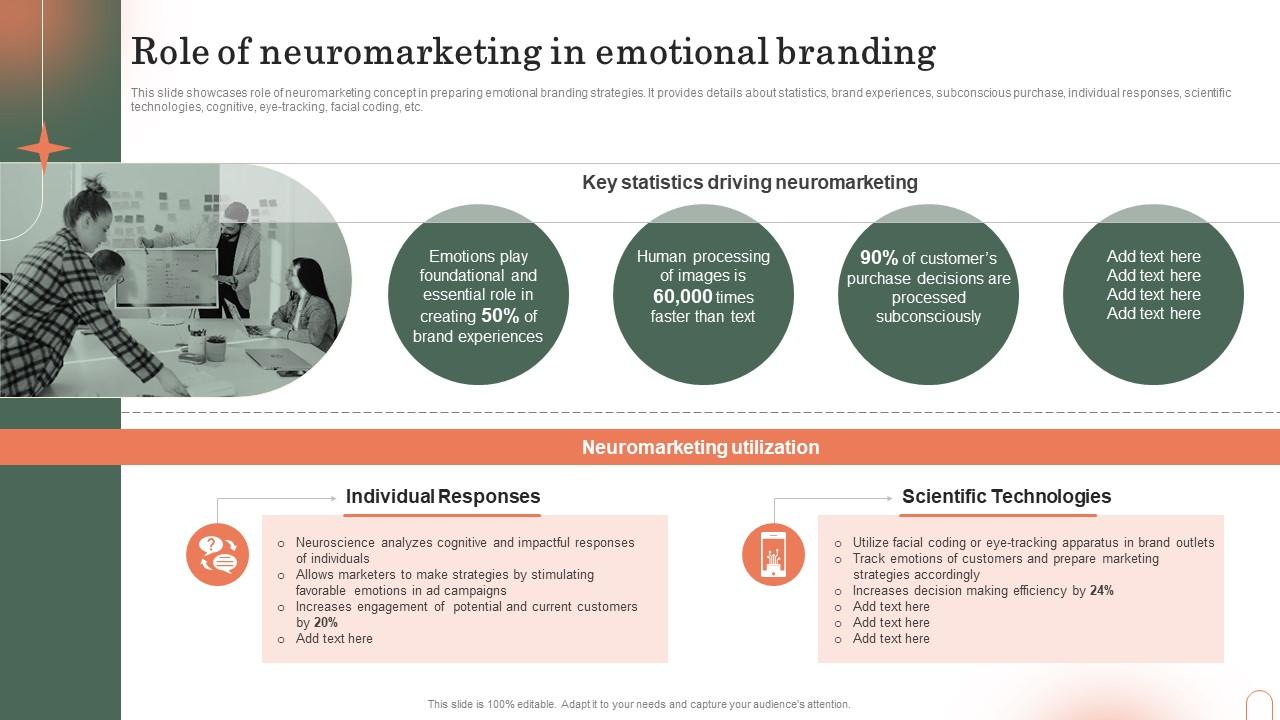
Role Of Neuromarketing In Emotional Branding Emotional Branding Strategy
This slide showcases role of neuromarketing concept in preparing emotional branding strategies. It provides details about statistics, brand experiences, subconscious purchase, individual responses, scientific technologies, cognitive, eye-tracking, facial coding, etc. Increase audience engagement and knowledge by dispensing information using Role Of Neuromarketing In Emotional Branding Emotional Branding Strategy. This template helps you present information on three stages. You can also present information on Individual Responses, Scientific Technologies, Neuromarketing Utilization using this PPT design. This layout is completely editable so personaize it now to meet your audiences expectations.
This slide showcases role of neuromarketing concept in preparing emotional branding strategies.It provides details about statistics, brand experiences, subconscious purchase, individual responses, scientific technologies, cognitive, eye-tracking, facial coding, etc.
- Make Visual
- Focus Sound
- Incentivize Scents
How Does Emotional Branding Works Nike Emotional Branding Ppt Icons
This slide showcases process of emotional branding with key stages helping to develop customer experience. It provides details about capture attention, encourage purchasing, develop loyalty, embed brand in customers life, develop relationship, loyalty programs, etc. Present the topic in a bit more detail with this How Does Emotional Branding Works Nike Emotional Branding Ppt Icons. Use it as a tool for discussion and navigation on Capture Attention, Encourage Purchasing, Develop Loyalty. This template is free to edit as deemed fit for your organization. Therefore download it now.
This slide showcases process of emotional branding with key stages helping to develop customer experience. It provides details about capture attention, encourage purchasing, develop loyalty, embed brand in customers life, develop relationship, loyalty programs, etc.
- Capture Attention
- Encourage Purchasing
- Develop Loyalty
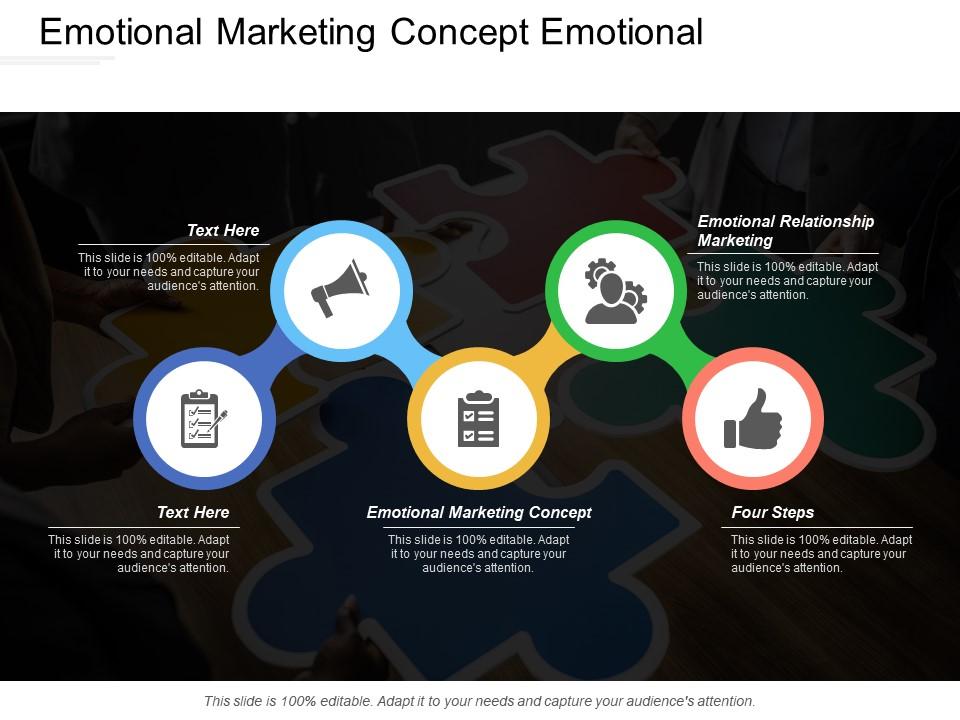
Emotional marketing concept emotional relationship marketing four steps cpb
Presenting this set of slides with name - Emotional Marketing Concept Emotional Relationship Marketing Four Steps Cpb. Emotional Marketing Concept Emotional Relationship Marketing Four Steps Cpb. This is an editable five stages graphic that deals with topics like Emotional Marketing Concept, Emotional Relationship Marketing, Four Steps to help convey your message better graphically. This product is a premium product available for immediate download, and is 100 percent editable in Powerpoint. Download this now and use it in your presentations to impress your audience.
Lick off the cream with our Emotional Marketing Concept Emotional Relationship Marketing Four Steps Cpb. Your thoughts will float to the top.
- Emotional Marketing Concept
- Emotional Relationship Marketing

Emotional Branding Strategy To Foster Customer Relationships Emotional Branding Strategy
Introducing Emotional Branding Strategy To Foster Customer Relationships Emotional Branding Strategy to increase your presentation threshold. Encompassed with one stage, this template is a great option to educate and entice your audience. Dispence information on Emotional, BRANDING STRATEGY, Foster Customer Relationships, using this template. Grab it now to reap its full benefits.
Our Emotional Branding Strategy To Foster Customer Relationships Emotional Branding Strategy are topically designed to provide an attractive backdrop to any subject. Use them to look like a presentation pro.
- Branding Strategy
- Foster Customer Relationships
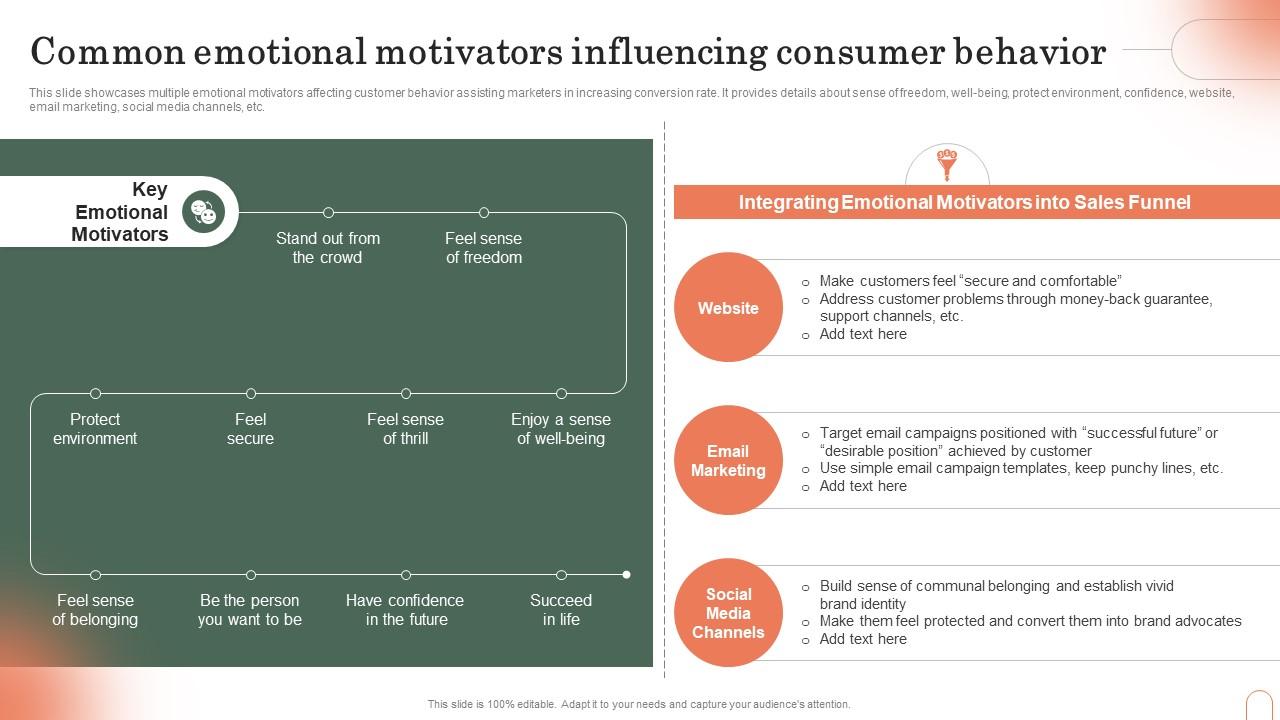
Common Emotional Motivators Influencing Consumer Behavior Emotional Branding Strategy
This slide showcases multiple emotional motivators affecting customer behavior assisting marketers in increasing conversion rate. It provides details about sense of freedom, well-being, protect environment, confidence, website, email marketing, social media channels, etc. Deliver an outstanding presentation on the topic using this Common Emotional Motivators Influencing Consumer Behavior Emotional Branding Strategy. Dispense information and present a thorough explanation of Integrating Emotional, Motivators, Campaign Templates using the slides given. This template can be altered and personalized to fit your needs. It is also available for immediate download. So grab it now.
This slide showcases multiple emotional motivators affecting customer behavior assisting marketers in increasing conversion rate.It provides details about sense of freedom, well-being, protect environment, confidence, website, email marketing, social media channels, etc.
- Integrating Emotional
- Campaign Templates
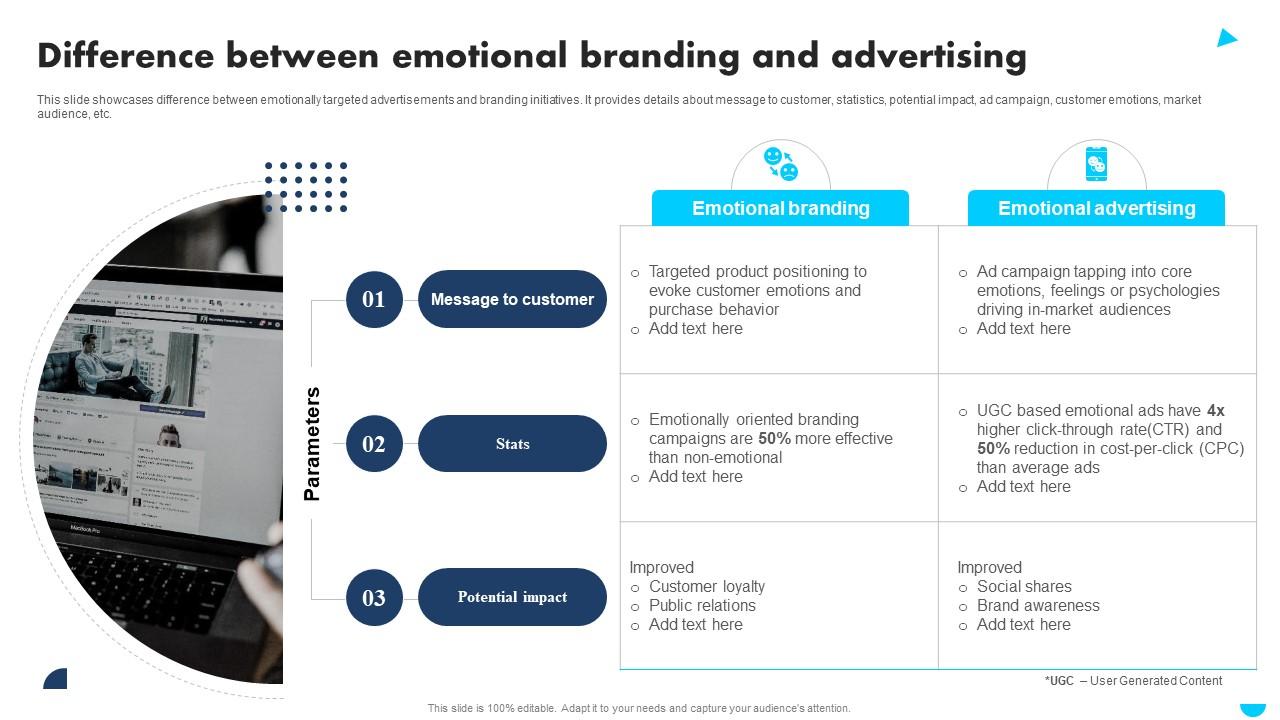
Apple Emotional Branding Difference Between Emotional Branding And Advertising
This slide showcases difference between emotionally targeted advertisements and branding initiatives. It provides details about message to customer, statistics, potential impact, ad campaign, customer emotions, market audience, etc. Present the topic in a bit more detail with this Apple Emotional Branding Difference Between Emotional Branding And Advertising. Use it as a tool for discussion and navigation on Message To Customer, Stats, Potential Impact. This template is free to edit as deemed fit for your organization. Therefore download it now.
This slide showcases difference between emotionally targeted advertisements and branding initiatives. It provides details about message to customer, statistics, potential impact, ad campaign, customer emotions, market audience, etc.
- Message To Customer
- Potential Impact
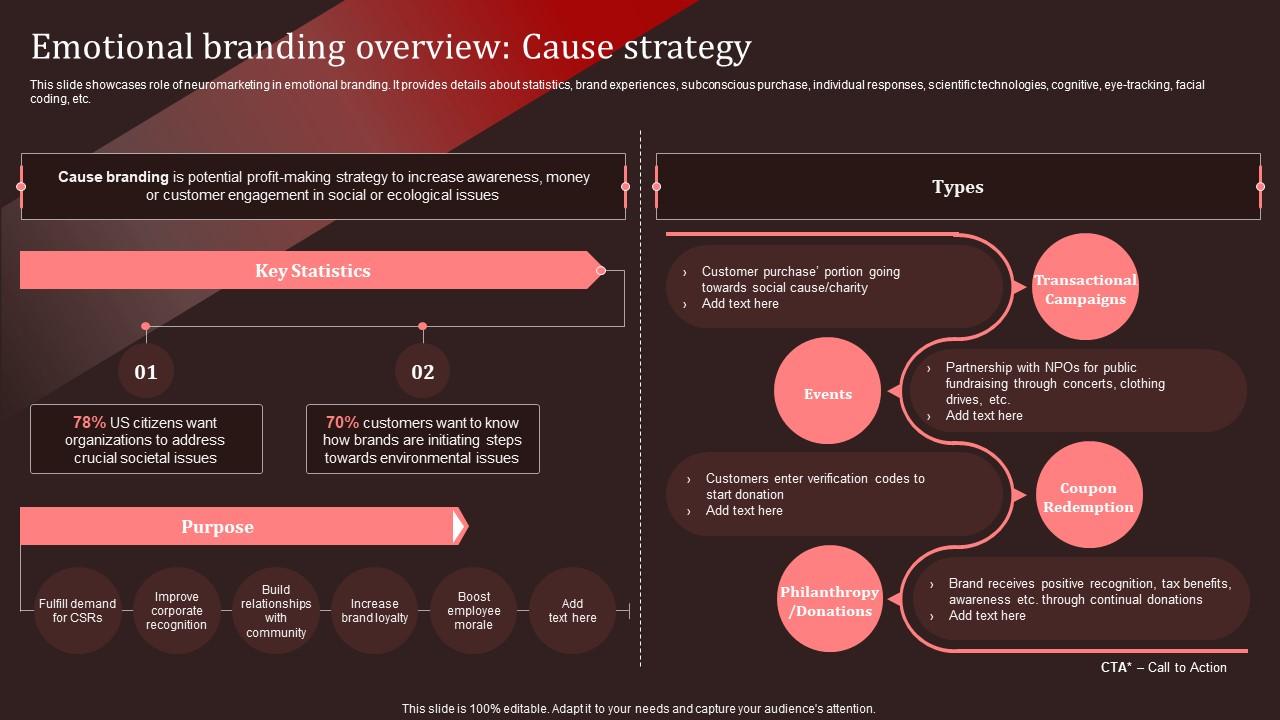
Emotional Branding Overview Cause Strategy Nike Emotional Branding Ppt Topics
This slide showcases role of neuromarketing in emotional branding. It provides details about statistics, brand experiences, subconscious purchase, individual responses, scientific technologies, cognitive, eye-tracking, facial coding, etc. Present the topic in a bit more detail with this Emotional Branding Overview Cause Strategy Nike Emotional Branding Ppt Topics. Use it as a tool for discussion and navigation on Key Statistics, Transactional Campaigns, Cause Strategy. This template is free to edit as deemed fit for your organization. Therefore download it now.
This slide showcases role of neuromarketing in emotional branding. It provides details about statistics, brand experiences, subconscious purchase, individual responses, scientific technologies, cognitive, eye-tracking, facial coding, etc.
- Key Statistics
- Cause Strategy

Emotional Intelligence
A presentation by
Dr.K.Balasubramanian
CEO, Vision Unlimited
www.visionunlimited.in
http://visionunlimitedchennai.blogspot.com
Emotional Intelligence is very important for managers as it is one of the important deciding factor for relationship management resulting in motivation, retention , self management & managing others.
Emotional Intelligence is the ability of an individual to deal successfully with other people , to manage one’s self, motivate other people, understand one's own feelings and appropriately respond to the everyday environment
- In Working with Emotional Intelligence, author Daniel Goleman defines EI in the workplace as the ability of employees to recognize:
- Their own feelings�
- The feelings of others�
- What motivates them�
- How to manage their emotions, both in themselves and in relationships with others
Emotional Intelligence doesn't mean being soft – it means being intelligent about emotions – a different way of being smart. Emotional intelligence is your ability to acquire and apply knowledge from your emotions and the emotions of others in order to be more successful and lead a more fulfilling life.
Components of Emotional Intelligence
There are five parts to it. One is knowing what you're feeling. The second is managing your feelings, especially distressing feelings. The third is self-motivation, the fourth is empathy and the fifth is managing relationships
EQ is the distinguishing factor that determines if we make lemonade when life hands us lemons or spend our life stuck in bitterness
EQ is the distinguishing factor that help us to maintain a warm relationship or a distant contacts.
Just to share a moment…
Recently, I had a discussion with a close friend about the tough time he was having dealing with difficult past experiences with family members. He said he was even more frustrated by the fact that they didn't even seem to realize that he was upset. When I pointed out that he seemed to be the one who was suffering over this past misgiving, he admitted that he wanted to feel better about it but was having difficulty forgiving and letting it go.
I am amazed by how many times I have heard this, many of us carry around past hurts that weigh on us and can be extremely painful. Lack of forgiveness can be like a festering wound that never heals, often throbs and is easily opened. Issues that are left unresolved can manifest into other problems such as stress, anxiety, unresolved anger, and poor self-esteem.
In this case, we talked about how everyone, at one point or another, has made mistakes or done things they later wished they could go back in time to alter. We also talked about how liberating it feels when the person you harmed is able to find forgiveness. By the end of our conversation, he said he was beginning to understand that forgiveness is a two-way street and that if he wanted to be forgiven of his mistakes, he needed to offer others the same courtesy
When we spoke later, he said had been giving a lot of thought to our conversation and had realized that the only person he was hurting with his lack of forgiveness was himself. Fortunately, once he realized that, he was able to forgive his family members for the past offense without even needing to drag everything up again. He sounded so relieved and it was great to hear such relief in his voice.
Forgiveness is a powerful tool for self-healing. When we can finally just let go and love people for who they are, even when they have hurt us, we free ourselves from any self-imposed bondage of angst and anger, and we also find it easier to forgive ourselves for our own mistakes. Friends, give this some thought to see if you are holding onto some past misgiving that has been weighing you. If so, it is time for a good emotional cleaning!
Have you come across these situations??…
Relationship Problems – when you fail to communicate what you need; when you lose the confidence of your team members; when you are acknowledged as – “never approachable”
Rage in the Workplace – Outburst of emotions
Poor decision making capability – Pre-occupied with frustrated thoughts
Failure to advance in career – losing track of the actual purpose!
This happens when we neglect to manage our emotions…
High rate of attrition in your team (healthy or bad!) – People start leaving you…not the job. Think! They start moving away from your vision
Lack of complete delegation – Lack of trust leading to micromanaging, when it actually can be avoided
How then can one improve emotional intelligence?
- Pay attention to self and other’s body language
- Listen more; speak less- develops empathy
- Get curious, not furious- Watch what you say especially when frustrated or annoyed. Reframe negative emotions into curiosity - " ... this makes absolutely no sense to me" can be replaced with, "Do you see something in this that I must be missing”
- Elicit pride in others – Reason for working together
- Remember that emotions are contagious - A dominant person's emotions (negative or positive) always influences others. Leaders should be careful to show only those emotions, which they want to see in others
Maslow’s theory of Motivation
Well, you have got to have friends
Loneliness breaks the spirit� -Jewish Proverb
The power of belongingness
“If you could do just one thing that would lengthen your life, help you stay psychologically and physically healthy, and support your healing when you did become ill, you would maintain strong connections to other people. The effects of belongingness are so potent that if they could be bottled, they would need FDA approval.”��-- Living A Connected Life
Being Connected to family and friends
“We have all known the long loneliness and we have learned that the only solution is love and that love comes with community.”
To know thyself
- What do you bring into your relationships?
- How well do you know yourself?
- The Persona and The Shadow
- You can’t have a better relationship with anyone else than the one you have with yourself
- Emotional Intelligence (EQ)
- “To know others is to be wise, to know oneself is to be enlightened”
- – Tao Te Ching
Why emotions
- With out feeling and emotions we will be like robots.
- It is the feeling and emotions, our likes and dislikes that give our life meaning that make us happy or unhappy, fulfilled or dissatisfied and that to a large degree decide our course of action and even on our health
Emotional intelligence
- It is different way of being smart
- It includes knowing what your feelings are and using your feelings to make good decisions in life.
- And it’s a social skill- getting along with other people, managing emotions in relationships, being able to persuade or lead others.
It involves various skills
- Self awareness
- Managing emotions.
- Social skills
Can it be learnt at any age
- The answer is yes
- You can upgrade your skill at any stage of your life
- In fact age and maturity are positively correlated with EQ
- Emotional intelligence skills are making us effective in life challenges and useful for everybody.
- Useful for everyone who want to be happy and effective in life.

IMAGES
COMMENTS
Apr 15, 2014 · Emotional intelligence is a person’s ability to understand their own emotions, the emotions of others, and to act appropriately using these emotions. Emotional intelligence never stops growing. Because we are always evolving as people, EQ is something that must be nurtured. Emotional Intelligence - Gihan aboueleish 4
The Benefits of Emotional Intelligence at Work On the job, people with higher emotional intelligence excel at: • Staying calm under pressure • Resolving conflict effectively • Behaving with empathy • Leading by example • Those with high levels of Emotional Intelligence delegate more effectively and more emphatically
Mar 13, 2019 · Emotional Intelligence. Ashley Bartholomew Cory Burton Ashley Dickens-York. Overview of Emotional Intelligence. Brief History EI Models/Measurement Ability Based Model Trait EI Model Mixed Models Problems/Criticisms of EI EI in the Workplace. Origins of the Concept.
Dec 26, 2015 · 3. Emotional Intelligence, or EI, is the ability to identify, assess, and manage the emotions of one's self, and of others. In other words, it is a distinct combination of emotional and social skills and competencies that influence our overall capability to cope effectively with demands and pressures of work and life. EQ, or Emotional Quotient, is how one measures Emotional Intelligence ...
These PPTs can be customized to include key concepts such as self-awareness, self-regulation, empathy, and social skills, allowing presenters to tailor their content to resonate with their audience.For instance, a PPT on emotional intelligence can be used in corporate training sessions to help employees develop better interpersonal skills ...
Emotional Intelligence doesn't mean being soft – it means being intelligent about emotions – a different way of being smart. Emotional intelligence is your ability to acquire and apply knowledge from your emotions and the emotions of others in order to be more successful and lead a more fulfilling life.